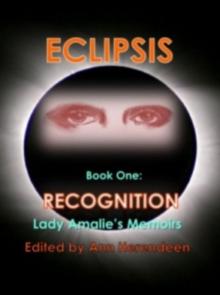- Home
- Ann Herendeen
Recognition Page 2
Recognition Read online
Page 2
In the course of my work as an information specialist I’d learned enough about Eclipsis to know that the climate was cold, with an alpine ecosystem. There were two moons, locked in a bizarre orbit that caused a solar eclipse at least once each day and twice on Crescent Day, the Sabbath of the eight-day week. Lunar eclipses were so common that seasonal holidays were marked by the occurrence of the rare full—and shadow-free moon.
Like most Protected Worlds, Eclipsis had been settled by desperate refugees in the early years of the Climate Cataclysm. During the intervening centuries, as Terrans adapted to rising and acidic oceans, volatile weather and hothouse temperatures, the descendants of the Eclipsian pioneers evolved in isolation, until modern times brought an influx of visitors: tourists, mostly, with the inevitable would-be developers and hucksters.
As with any unknown group, rumors abounded: that the Eclipsians were inbred halfwits; that they went naked and barefoot in the snow; and that they practiced a form of magic that seemed to work and had no rational explanation. Shamans, mediums, channellers, positive-thinkers, faith-healers and priests: I’d heard it all before. Every civilization, from the “primitive” to the “advanced,” has its cults and its cult leaders. It’s an unavoidable byproduct of human society, like offal from livestock. If you don’t like tripe, stick with broccoli.
I had weighed the two unappealing ideas against each other: living in a semi-feudal state with limited technology, or clinging to the modern conveniences of a world that wasn’t good for my mental or physical health. For my thirty-fifth birthday I gave myself a present: I applied for a job on Eclipsis.
Getting hired was easy, in a way. All I had to do was convince the interviewer that I wanted to go somewhere cold, dark and remote, without appearing to be psychotic. “I see it as a professional challenge,” I’d said, stringing together the words and phrases I read in her thoughts, the ideal responses to the needling questions that were designed to weed out misfits like me. “Working under difficult conditions will force me to adapt, perfect my skills, instead of growing stale here.” It was my usual way of handling all social situations, and whether because of it, or because there were few candidates, I was offered the position, information manager at the Terran Protectorate Headquarters in Eclipsia, the largest city. Well, actually, the only city.
The trip out had given me plenty of time for second thoughts, misgivings, and the chance to bail out at the last station before the intergalaxial leap. I had never seriously debated. There was nothing on Terra to stay for. My parents were dead; I had no siblings, no children, not even a former lover worth calling to say good-by. All the budding friendships and romances of schooldays and workplace had dwindled to cool acquaintance, done in by the unavoidable but hurtful intrusions of one-way thought-reading.
Whatever I could find in life would have to be here. Despite the heat I slept, dreaming of mountains covered by forest, an icy, refreshing wind whistling through the treetops.
My first week, however, was disappointing. Nothing had changed. It was cold and gloomy outside, but I lived and worked in the Terran facilities with their controlled climate and full-spectrum lighting that made my third eyelids slam down as soon as I walked in the door. Better to be honest from the start, I decided, than to hide behind sunglasses, with the inevitable slip-up and disturbing reveal. My coworkers were all Terrans, as are most Protectorate employees, and their reactions to me on Eclipsis were the same as on Terra, as I learned from the thoughts that accompanied the round of introductions.
But one thing was new—my “lover.” Almost as soon as I took my first solitary walk outside, heading toward the crenellated parapet of ‘Graven Fortress that dominates the Eclipsian Sector of the city, he was there, a presence in my mind. The feeling was unlike anything I had ever experienced. It was a combination of love, sex and something indescribable, like looking in a mirror and seeing, not myself, but a reversed image or a photographic negative. It was total acceptance, knowing another person intimately and not worrying that what I might say or do was wrong. I could express any emotion, any idea to him, and feel only love in return. And he could do the same. I was aware of my own all-encompassing love for him as I felt his for me.
I never doubted he was real; the impressions were too distinct. He was male, no doubt about that, and he had to be Eclipsian. I had never come upon a Terran in this way, and something about him—his mind, his emotions, whatever it was I sensed—was slightly askew, off kilter. Like me. It was as if both of us were leaning away from the center, he in his direction, I in mine. If we connected, pulling in a loving tug-of-war, we would hold each other upright and steady, prevent ourselves from falling.
Yet I made no attempts to find him—I didn’t know how. It was enough for me at first, knowing that at certain times, in the evening, and at some quiet moments during the day, he would be with me. He came to me at work once, when I was unprepared. A coworker saw me, looking, I suppose, as if I had ingested a hallucinogen with my lunch. I could only smile and shake my head at the concerned questions, go to the bathroom and lock myself in, and wait for him to be called away on his own job, whatever that was. But most days, when I came home from work, accustomed to relaxing by reading, I would stare at the screen unseeing while his presence filled me with a kind of comfort that was like food. There, I would think. Just stay there.
My new job was less fulfilling. The official policy is strict observance of the rules for a Protected World: no corruption of the indigenous culture, no attempts to modernize the economy. Because of the stated directive for non-interference, we responded to requests from Terrans who wanted to know about start-ups and demographics, marketing and business plans with some version of, “Sorry there’s nothing yet available on that subject.” We were discouraged by the Terran higher-ups from giving the correct answers: “That’s illegal,” or “There’s no such thing.”
By the end of my first week I could see that the continuing Terran presence here was based on the unofficial conviction that this stubborn world would have to give in eventually to the delights of credit and unnecessary consumer goods, of advertising and infotainment. Like cockroaches teeming behind apparently clean walls, persisting in the face of hostility or indifference, we would outlast the dwindling opposition. Until then, we would stall. It hadn’t occurred to me on Terra, its innocence lost centuries before Eclipsis’ original settlement, how much I would dislike being a part of this.
After a few weeks, it was a relief from the monotony to learn that a crisis was bringing a delegation from the ‘Graven Coalition to the Terran offices. I had heard about the problems several years back, when the Coalition had complained that the Armaments Convention, which bans the use, manufacture or importation of all ballistic weapons, was not being enforced. The Terrans were still picking up the pieces from ignoring that warning, and were not about to reject the Coalition’s demands now, whatever they were, without hearing the details. I was invited to attend the meeting, as the subject was something to do with inter-world commerce.
The rest of the Terran party, which included the Consul and three or four other people I hadn’t met, was already there when I walked in. The room was in twilight, dimmer switch turned low, weak sun barely penetrating gauzy curtains. The ‘Graven are photophobic, someone said with a smirk.
As my inner eyelids slowly retracted, there was a silent interplay of worried glances and indecision among the Terrans. I stared back, daring them to challenge me. Nobody else said a word, other than a falsely affable greeting. My triumph was short-lived. Their thoughts showed they needed a recording of the meeting. Top executives, they saw the duty as beneath them. A newcomer, an information worker, I was the logical choice to perform this menial task.
We sat in uneasy silence. I checked the messages on my cube, hoping to find a minor request that I could turn into an emergency, an excuse to skip the meeting. Nothing.
Eventually we heard a group of people approaching, and a uniformed guard leapt through the open door, unsheath
ed sword held vertical in front of him. He explained to us in careful Terran that he was “securing the room,” then announced each individual as he or she entered.
The head of the Eclipsian group was the Viceroy, Lord Zichmni. That was impressive. There had been Roys—kings—not so long ago. Nowadays Viceroy was the highest office, although it was still called Viceroy, in the way of social revolutions that want to cover their rear, just in case.
There was only one woman, ‘Gravina Ndoko, and she wore a short burqa that covered her entire head and face. During the introductions, I felt all the Eclipsian minds, hers included, focusing on mine in a tentative exploration, but as soon as I became aware of it they stopped. It was if they could corral their mental activity within a narrow circumference when courtesy required, like looking away when the other person catches you staring.
The Viceroy, ancient but vigorous, wasted little time in getting things started, saying that violations of Eclipsis’ protected status had been brought to his attention. They were serious enough to warrant this meeting. In other words, he added, apologizing for the dreary subject, the topic was trade. My sympathy duly aroused, I determined to at least pretend interest.
Lord Zichmni motioned to one of the Eclipsians, an unusually tall, thin man who had caught my attention from the beginning. He was ‘Graven, a lord with a title, but he looked nothing like the others. Where they tended to be plump and doughy, with pink skin and fine, fair hair, his hair was thick and dark, making his skin appear dead white by contrast. He had the face of a hawk, dominated by a prominent narrow nose like a beak and with eyes that were truly unnerving—pale gray, almost colorless, round and unblinking.
Something about him seemed familiar. He had studied me just a little longer than good manners permit when the introductions had been made, and I had been startled by the effect of his gaze. It was as if, like an X-ray that illuminates the consciousness instead of the bones, he was seeing through my flesh, into my thoughts and memories—my very being. I had not dared look directly at him since. Perhaps when he spoke, I thought, I could determine what it was about him that I recognized. But of course I would have remembered if I had seen him before.
Now he came forward at the Viceroy’s request, carrying a large sack, which he emptied onto the meeting table. A variety of typical Terran trade goods bounced out: pirated music and game holograms, the kind that don’t require a machine to play them on; plastic shoes; disposable paper underwear; T-shirts printed with idiotic slogans in garbled Terran. Some of the smaller items fell on the floor and we leaned over to pick them up while the man began speaking.
“These things are being sold openly in the Exchange,” he said, referring to the marketplace set up by the Terrans in their sector, ostensibly to provide a showcase for Eclipsian goods. “I don’t understand how you can justify bringing such stuff to a Protected World, unless it’s all being smuggled in. Either way, we want it out.”
The man’s voice was as extraordinary as his appearance—a deep, resonant baritone, unexpected in one so slim, and with a musical quality I found mesmerizing. Like the Viceroy, he spoke Terran effortlessly, with only a slight accent, and with none of the expected pauses while searching for the appropriate word. Even his substitute of the word “stuff” for the coarser term I read in his thoughts had occurred so smoothly it had not disrupted the flow of his presentation.
We looked stupidly at the pile of junk until one of the Terran officials cleared his throat and said, “What exactly is your objection, Margrave Aranyi?” At least he got the man’s title and name right.
I could feel Lord Aranyi’s immense anger, and that of the other ‘Graven. His phrasing had been concise and to the point, leaving little room for argument. He turned his colorless eyes on the questioner, rotating his head like an owl sighting a mouse, although he answered courteously. “Eclipsis’ economy is based on barter. Many of us rarely use coin.” He smiled disingenuously and spread his hands. “And credits are a Terran concept most of us do not understand.” He looked down his long nose at his seated opponent, making it clear his ignorance was by choice.
“Now you arrive, you hire our people for work you’re not willing to do yourselves,” Lord Aranyi continued his explanation, “and you pay in credits. Since their wages are invisible and weigh nothing, our people naturally throw them away on things like this useless garment—” He held up a synthetic “cotton” T-shirt with “Baby Face” and arrows pointing down and up printed on it, tossed it aside, and picked up one of the little game cubes. “—and ‘Immortal…’ ” His frustration as he strained at the next word churned my stomach with sympathy. I realized that reading commercial Terran was difficult for him; trademarks, with their idiosyncratic spelling and fonts, impossible. “ ‘—Starfighters,’ ” he spat out the word as I supplied it to him telepathically, then spun around, glaring in my direction as if he’d been smacked in the head.
There was no real answer to his complaint. “I assure you,” the Consul said, addressing Lord Zichmni, “we are making every effort to keep unwanted trade good off Eclipsis.” His intonation was ironic, implying that the goods were unwanted only by the elite few, like Lord Aranyi.
The woman interrupted him. “But Lord Aranyi has just shown that you are not succeeding,” she said in a low, sweet voice. “We would like to know what you can do beyond whatever it is you are doing now.” The combination of her modest demeanor, her face invisible behind her burqa, and soft way of speaking made her sarcasm all the sharper, nor could it be answered in kind.
The Terran officials conferred. I read some of their thoughts, but learned only that they were considering what lie would go over best. They didn’t want to stop this trade, the sort of thing that went on without protest on every other Terran outpost. They had no mechanism to prevent it, never having needed one.
While the rest of the room waited for a reply, I entertained myself by listening in on the ‘Graven, who were no longer shutting in their thoughts but were sharing them silently, as the Terrans had just done in whispers. My cube was making a holographic recording of the meeting, and I decided to key in some commentary. Entering each mind in turn, I described the various personalities, paraphrasing their views, and, engrossed in the work, was oblivious to any reciprocal interest.
Suddenly a hand closed over mine as I pressed the buttons of my cube, and that same deep voice I had admired announced, “Yes, she’s the one.” Lord Aranyi had seized me, but he let go again at once with a yelp. “That doesn’t work with me,” he snarled.
“But it just did,” I said. I had felt the same thing he had, a kind of buzz, like a jolt of electricity only milder—enjoyable if one is prepared for it. Despite the shock of events, I was smiling.
We looked at each other, into each other.
“You!” he said, so softly I didn’t know if he spoke or thought.
We had joined in communion, a merging of consciousness, thoughts and feelings exchanged in an intimate occupation of the other’s being. It had happened so easily that, with no experience of communion, I knew only that here was my “lover,” the man I’d been conversing with mentally since my arrival. I couldn’t connect it at first, the sense of love and comfort I had received from that formless presence and this tall Eclipsian nobleman with a cold, proud face and an ingrained distrust of Terrans that was almost tangible.
And the Evil Eye. Even in the dim light, his eyes were now covered with a third lid of silver—as were mine. I could see my face reflected in the mirrors of his eyes.
He was as disoriented as I was, and we spent a few moments adjusting to the unusual perspective, seeing ourselves through the other’s mind and vision. He took in with something like amusement my alarm at his formidable appearance. But his reaction to my physical being flowed through me, reviving my demoralized spirit like a healing massage on overworked muscles. When he looked at me he saw, not the genetic aberration I am on Terra, but a woman who, in his society, was an aristocrat by birth. My inner eyelids, descended and tur
ned opaque silver, as happens only in sunlight—or with strong emotion—marked me as noble, and beautiful, desirable. I had gone, in what I would always remember as the Twinkling of an Eye, from Damnation to Resurrection.
It was my Terran clothes, my cropped hair, shorter than his or the other ‘Graven’s, and, most of all, my Terran memories and thought patterns, that confused him, just as his outward fierceness contradicted my emotional response to him.
Already I hated to think I made him uncomfortable. Not uncomfortable, cherie, he thought to me. Just—different. That word didn’t sound so bad when he said it. And he had called me cherie, a term of endearment a man uses with his lover.
What do I call you? I asked.
Dominic, he told me his given name. Dominic-Leandro. I sighed with pleasure at the rightness of it, the elegance.
Amelia, I answered his unspoken request in turn. Amelia Katherine Herzog, I added, in case he hadn’t registered the Terran surname during the introductions.
Amalie, he repeated, finding the Eclipsian equivalent. Amalie-Katrin. The ordinary names sounded glamorous and exotic, transformed by the language and his voice.
What’s Aranyi up to now? The Terrans must be crazy to try that. Our communion ended abruptly as the rest of the ‘Graven forced their way in, interposing their thoughts between me and my lover, pushing us apart, until I was back, alone in my own consciousness, the ‘Graven glaring at me, the Terrans unsure what had happened.

 Birth: A Novella
Birth: A Novella Wedding
Wedding Pride / Prejudice
Pride / Prejudice Recognition
Recognition Captivity
Captivity